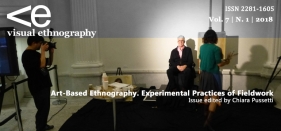Artisans, Alcoholics and Artists: In Search of Descriptions of Experimental Ethnographic Realities
W czasopiśmie Visual Ethnography vol.7 nr 1 (2018) ukazał się artykuł autorstwa Ewy Rossal i Tomasza Rakowskiego Artisans, Alcoholics and Artists: In Search of Descriptions of Experimental Ethnographic Realities
Abstrakt
In this article we aim to present three kinds of artistic-ethnographic projects in a way to provoke reflection about creating experimental ethnographic realities and searching for new languages of their description. Starting from a very neutral project, this article passes through a provocative fake business and ends with an action that is quite controversial in ethical terms. First, we describe the „Work Culture" project in the town of Lublin, Southeast Poland which was realized by the „Field Collective”, a group of artists and anthropologists, and conducted in a place like railway station district. The Collective undertook attempt to learn the craft from the local artisans and to create meeting situations that were revealing the embodied, manual knowledge of the performed work. They used film as a visual tool but not as the point of coming up, but it has accompanied them from the beginning, influencing the encounter and bringing a new conditions for ethnography. Second, we present a description of the Tear Dealer, a project conducted by the artists Alicja Rogalska and Łukasz Surowiec, in the town of Lublin of Southeast Poland. In this case we show a kind of faked, new-business set in an impoverished urban district as a particular artistic-ethnographic trap designed for producing the moment of slowing down faced an unexpected emotional work. Third, we draw on the „Outpatient clinic” project that was at the same time an artistic and research project, a showcase and a prototype of action in which the artist, Łukasz Surowiec, created the situation of meeting of actively drinking alcoholics, anthropologists, artists and casual passerby. In these three cases we propose a new theoretical-descriptive framework to the experimental research situations that have been revealed, especially while facing an unexpected emotional work, the unplanned expressions, interventions and experiences. Through this, we also show how artistic experiments with visual and audio-visual methods influence ethnographic perception, and how the films, pictures and recordings used during the project have become an inseparable part of the situation.



